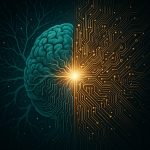
Question #1: What is Artificial Intelligence (AI) and what kinds of AI are there?
As stated by the philosopher William MacAskill, “artificial intelligence is a branch of computer science that aims to design machines that mimic or replicate human intelligence.”[1] There are several different kinds.[2]
First, there is what is called “Weak AI” or “Narrow AI” which refers to technologies already widely developed that refine or advance a particular task such as computation.
Second, there is “Strong AI” or “Artificial General Intelligence.” If achieved this kind of AI, computers would be able to learn from experience and perform, and a higher-level not just one task by many tasks and do them better than humans ever could on their own.
Finally, there is “Superintelligence” (SI). If ever realized, a superintelligent being would engage in self-learning, self-improvement, and autonomous reasoning.
Question #2: In what ways could (and does) AI benefit humanity?
The futurist philosopher William MacAskill notes two ways the development of AGI would be of monumental importance to our future. First, he argues that it might greatly speed up the rate of technological progress, but automating technological innovation, and second, economic growth, but producing more AI workers.
And with the expected transition from weak to strong and super intelligence, there is hope that AI will help us reverse aging, cure disease, end world hunger, and even achieve immortality.
Question #3: What are potential (and actual) problems and perils with AI?
Here are three actual and potential problems with AI.
First, there is the threat of human injustice.
Second, there is the threat of human diminishment.
Third, there is the threat of human extinction.
Question #4: What are some new spiritualities that are emerging given AI? How should Christians think about AI?
When it comes to new religions or spiritualities that are emerging given recent advances in AI, along with the hope, for many, that one day we’ll develop conscious AI agents, there are new pressing questions for Christians to consider.
First, let’s consider the challenges to faith that result from increasingly more humanlike AI. We’ll then consider challenges to faith that result from the shift, for many, to view AI as godlike.
[1] William MacAskill, What We Owe the Future (New York: Basic Books, 2022), 80.
[2] For a helpful overview of the various kinds of AI, organized in terms of these three capabilities and four functions, see: https://www.ibm.com/think/topics/artificial-intelligence-types.





